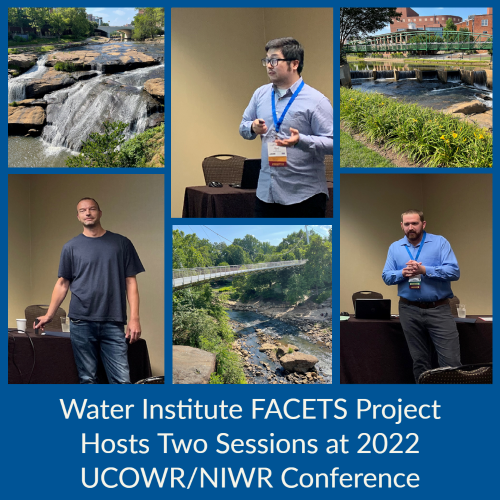Water Institute FACETS Project Hosts Two Sessions at 2022 UCOWR/NIWR Conference
Last week the Water Institute-led project, Floridan Aquifer Collaborative Engagement for Sustainability (FACETS), hosted two sessions (see list of presentations below) at the 2022 UCOWR/NIWR Annual Water Resources Conference in Greenville, SC. This event provided the opportunity for the project team to share project findings and discuss scientific and policy implications of results with water professionals from across the USA.
The goal of the FACETS project is to promote economic sustainability of agriculture and silviculture in North Florida and South Georgia while protecting water quantity, quality, and habitat in the Upper Floridan Aquifer and the springs and rivers it feeds. The project includes BMP Field Research in Florida and Georgia to quantify water and nutrient use, water quality impacts and yields of agricultural Best Management Practices (BMPs). Through extension programming, project team members share the results of this field research and encourage the adoption of promising practices on producers’ farms. A modeling platform has been developed, based on BMP experiment results, to predict farm/forest scale and regional-scale impacts of alternative land use and production practices on the water quantity, water quality, and the economy in N. Florida and S. Georgia. This information allows evaluation of farm/forest- and regional-scale economic-environmental tradeoffs across cropping systems, BMPs, soils and climatic conditions. A key aspect of the FACETS project is its “Participatory Modeling Process” through which scientists and project stakeholders co-develop the modeling platform and explore and interpret economic-environmental tradeoffs of alternative scenarios. By integrating stakeholder knowledge and experience, new and existing experimental data, and diverse modeling expertise, the project expects that model outputs will be more trusted and useful for decisions makers.
Session 1: FACETS Project Overview and Farm-Forest Scale Analyses
Wendy Graham – Stakeholder-Driven Modeling in Support of Groundwater Sustainability: The Floridan Aquifer Collaborative Engagement for Sustainability (FACETS) Project Overview
Michael Dukes – Agronomic and Nitrogen Dynamics of a Corn-Carrot-Peanut Crop Rotation
Wesley Porter – Large Scale Implementation of Soil Moisture Sensors in Georgia: What Did We Learn?
Nathan Reaver– Quantifying Environmental and Economic Tradeoffs for Agricultural and Silvicultural Practices in the Floridan Aquifer Region
Session 2: FACETS Regional-Scale Analyses
Dogil Lee– Modeling the Impacts of Agricultural Practices on Nitrate Loads, Streamflow and Crop Yields in the Santa Fe River Basin
Rob De Rooij – Simulating Nitrate Loading and Nitrate Transport to the Devil’s Springs Complex in the Santa Fe River Basin, FL using SWAT-MODFLOW and MODPATH
Ritesh Karki Evaluating the Water Quantity and Environmental Benefits of Sustainable Agricultural Management Practices in the Lower Apalachicola-Chattahoochee-Flint River Basin, USA
Yu-Kai Huang– A Stochastic Dynamic Optimization Approach for Understanding Expected Land Use Changes to Meet Potential Water Quality Regulations: A Case Study from Georgia, United States
June 20, 2022


